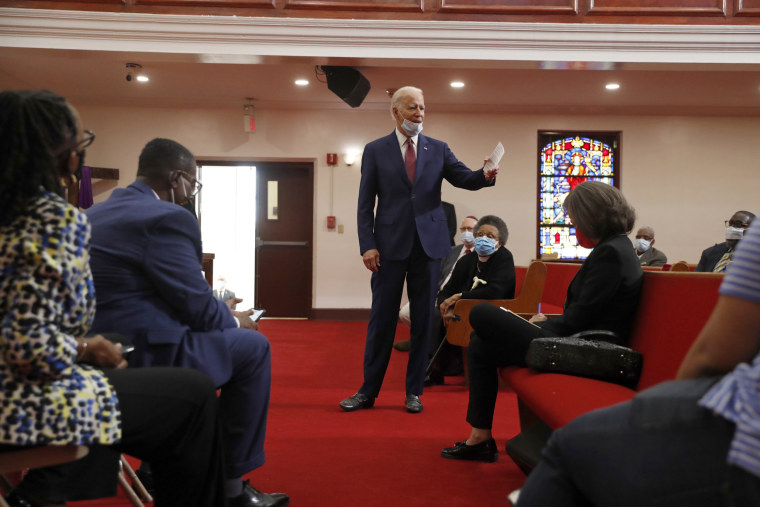As "holidays" go, the official National Day of Prayer is probably a little obscure for much of the public. Nevertheless, it's been around for a little while: Congress established an annual prayer day in 1952, and in 1988, lawmakers agreed to set the date for the occasion as the first Thursday in May.
Or put another way, whether you received a Hallmark card marking the occasion or not, according to federal law, the National Day of Prayer in the United States was yesterday.
For now, let's put aside the constitutional incongruity of a secular government having a state-sanctioned day in which elected leaders encourage Americans to honor prayer. Instead, what was of particular interest this year was President Joe Biden's proclamation recognizing the 2021 National Day of Prayer.
At first blush, the Democrat -- the nation's second Roman Catholic president, and a regular church-goer -- issued a straightforward proclamation that reads the way one might expect it to read:
"Throughout our history, Americans of many religions and belief systems have turned to prayer for strength, hope, and guidance. Prayer has nourished countless souls and powered moral movements — including essential fights against racial injustice, child labor, and infringement on the rights of disabled Americans. Prayer is also a daily practice for many, whether it is to ask for help or strength, or to give thanks over blessings bestowed."
From there, Biden's statement explained that our First Amendment protections, including religious liberty, "have helped us to create and sustain a Nation of remarkable religious vitality and diversity across the generations."
The declaration went to recognize the nation's ongoing crises and the fact people of faith "can call upon the power of prayer to provide hope and uplift us for the work ahead." It then quoted the late-Rep. John Lewis (D-Ga.), who said, "Nothing can stop the power of a committed and determined people to make a difference in our society. Why? Because human beings are the most dynamic link to the divine on this planet."
It concluded with an inclusive and optimistic message that was entirely in line with Biden's larger vision:
"On this National Day of Prayer, we unite with purpose and resolve, and recommit ourselves to the core freedoms that helped define and guide our Nation from its earliest days. We celebrate our incredible good fortune that, as Americans, we can exercise our convictions freely — no matter our faith or beliefs. Let us find in our prayers, however they are delivered, the determination to overcome adversity, rise above our differences, and come together as one Nation to meet this moment in history."
So why am I mentioning all of this? Because it turns out that quite a few folks on the right found the president's declaration outrageous.
Beth Stoneburner pulled together several examples of conservative voices denouncing the White House's Prayer Day statement for a reason I didn't see coming.
The Christian Broadcasting Network's David Brody, for example, slammed Biden's proclamation as "pathetic" because it referenced climate change and racial justice, but didn't explicitly use the word "God."
Jenna Ellis, a former lawyer for Team Trump, added, "Joe Biden's Godless Prayer Proclamation: no mention of God or even a Bible quote! Instead we get a quote from John Lewis and a proclamation invoking climate change. It looks like a DNC Memo!"
For his part, Franklin Graham wrote, "Why would President Biden omit God? ... That speaks volumes doesn't it? It is hard to believe we have come this far. Omitting God is a dangerous thing."
It's apparently not enough that the White House issue a prayer day proclamation. For some on the right, the president also has to use specific spiritual language that conservatives want to hear.
Though I don't imagine these Biden critics intended to make such a point, their criticisms help reinforce why the National Day of Prayer is itself so dubious. For the faithful, every day is a day of prayer, and faith communities don't need a government or a president to promote prayer's importance.
In fact, when government tries to intervene, even delicately, it leads to the kind of public pushback the White House is receiving from the likes of Graham, Ellis, and Brody, who are apparently disgusted that their spiritual beliefs weren't endorsed by the government in a way they found satisfying.
It's possible that next year, Biden and his team will accommodate such criticisms by including direct "God" references, though that could lead to related criticisms from polytheists, pantheists, or atheists who might expect the White House to endorse their beliefs, too. The president could try the next year to be even more inclusive, leading to questions as to why Biden didn't use some Americans' preferred name for God or references to their preferred holy text.
One possible solution to such thorny theological issues is for the government to stay out of the religion-promotion business altogether.
